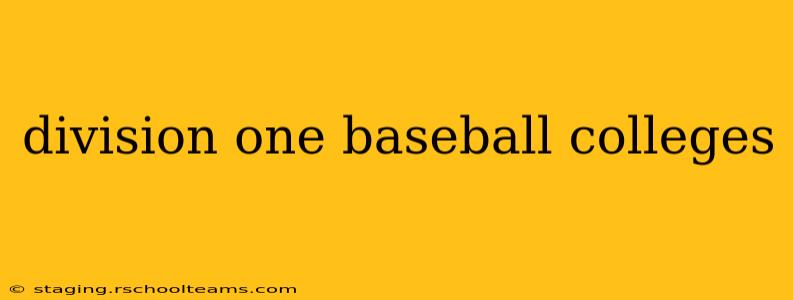Choosing the right college is a big decision, especially for aspiring baseball players aiming for the Division I level. This guide provides a comprehensive overview of Division I baseball colleges, helping you navigate the landscape and understand what it takes to succeed. We'll explore factors to consider, highlight some top programs, and offer advice on the recruiting process.
What Makes a Division I Baseball College Program Stand Out?
Division I baseball programs are highly competitive, attracting top talent from across the nation and even internationally. Several key factors differentiate the elite programs from the rest:
- Coaching Staff: Experienced coaches with proven track records of developing players and achieving success are crucial. Look for coaches with strong recruiting networks and a history of sending players to professional baseball.
- Facilities: Top-tier programs invest heavily in their facilities, including state-of-the-art training centers, well-maintained fields, and advanced technology for player development.
- Academic Support: Balancing academics and athletics is vital. Strong academic support services, including tutoring and academic advising, are essential for student-athletes to succeed in the classroom.
- Team Culture: A positive and supportive team culture fosters camaraderie and enhances performance. Look for programs that prioritize teamwork, leadership development, and a commitment to academic excellence.
- Alumni Network: A robust alumni network can provide valuable connections for future careers in and beyond baseball.
Key Metrics to Consider:
While wins and losses are important, consider these broader metrics when researching programs:
- Winning Percentage: Consistent success indicates a strong program.
- NCAA Tournament Appearances: Regular appearances in the NCAA tournament demonstrate competitiveness and talent.
- Professional Draft Picks: The number of players drafted by professional organizations showcases the program's ability to develop talent.
- Academic Progress Rate (APR): This metric reflects the academic success of student-athletes.
Top Division I Baseball Colleges: A Snapshot
It's impossible to create an exhaustive list, as many excellent programs exist. However, consistently strong performers include (but are not limited to):
- Vanderbilt University: A perennial powerhouse with a history of national championships and producing major league talent.
- UCLA Bruins: A West Coast giant with a long-standing tradition of excellence and a strong recruiting base.
- University of Oregon: A program that has shown consistent improvement and competitiveness.
- Texas A&M Aggies: Known for strong pitching and consistent success in the SEC.
- University of Florida Gators: Another SEC powerhouse with a rich baseball history and highly competitive program.
- Stanford University: A program that combines academic excellence with strong baseball performance.
- University of Arkansas Razorbacks: Recent success and a strong reputation for player development.
This is just a small sample; many other universities have exceptional Division I baseball programs. Researching individual programs based on your specific academic and athletic goals is crucial.
Navigating the Recruiting Process
The recruiting process for Division I baseball is highly competitive. Key steps include:
- Creating a highlight reel: Showcase your skills and abilities through a well-produced video.
- Building relationships with coaches: Attend showcases and camps, and proactively contact coaches.
- Maintaining strong academic performance: Your academic record is just as important as your athletic achievements.
- Understanding the NCAA rules: Familiarize yourself with NCAA regulations regarding recruiting.
Conclusion
Choosing a Division I baseball college requires careful consideration of various factors beyond just on-field success. By focusing on the aspects discussed above, aspiring student-athletes can increase their chances of finding the perfect fit and achieving their goals. Remember to thoroughly research programs, connect with coaches, and prioritize both your academic and athletic pursuits. Good luck!
